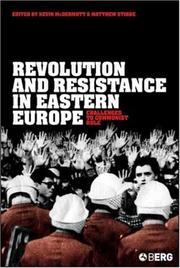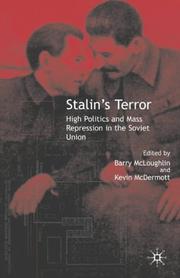| Listing 1 - 9 of 9 |
Sort by
|
Book
ISBN: 9780230217157 9780230217140 Year: 2015 Publisher: [place of publication not identified] Palgrave Macmillan
Abstract | Keywords | Export | Availability | Bookmark
 Loading...
Loading...Choose an application
- Reference Manager
- EndNote
- RefWorks (Direct export to RefWorks)
Book
ISBN: 0333552849 0333552830 Year: 1996 Publisher: Basingstoke Macmillan
Abstract | Keywords | Export | Availability | Bookmark
 Loading...
Loading...Choose an application
- Reference Manager
- EndNote
- RefWorks (Direct export to RefWorks)
World history --- anno 1940-1949 --- anno 1930-1939 --- anno 1920-1929 --- World politics --- Communist parties --- Politique mondiale --- Partis communistes --- History --- Histoire --- Communist International --- History. --- 316.323.72 --- 330.8 --- Socialistische maatschappijvormen --- Economisch denken. Economische scholen. Economische theorieen --- 330.8 Economisch denken. Economische scholen. Economische theorieen --- 316.323.72 Socialistische maatschappijvormen
Book
ISBN: 3319770683 3319770691 Year: 2018 Publisher: Cham : Springer International Publishing : Imprint: Palgrave Macmillan,
Abstract | Keywords | Export | Availability | Bookmark
 Loading...
Loading...Choose an application
- Reference Manager
- EndNote
- RefWorks (Direct export to RefWorks)
This collection of thirteen essays examines reactions in Eastern Europe to the Prague Spring and Warsaw Pact invasion of Czechoslovakia in 1968. Countries covered include the Soviet Union and specific Soviet republics (Ukraine, Moldavia, the Baltic States), together with two chapters on Czechoslovakia and one each on East Germany, Poland, Hungary, Bulgaria, Romania, Yugoslavia and Albania. The individual contributions explain why most of these communist regimes opposed Alexander Dubček’s reforms and supported the Soviet-led military intervention in August 1968, and why some stood apart. They also explore public reactions in Eastern Europe to the events of 1968, including instances of popular opposition to the crushing of the Prague Spring, expressions of loyalty to Soviet-style socialism, and cases of indifference or uncertainty. Among the many complex legacies of the East European ‘1968’ was the development of new ways of thinking about regional identity, state borders, de-Stalinisation and the burdens of the past. .
History. --- History, Modern. --- Europe --- Russia --- Europe, Eastern --- World War, 1939-1945. --- World politics. --- Russian, Soviet, and East European History. --- History of Modern Europe. --- Political History. --- History of World War II and the Holocaust. --- Modern History. --- Colonialism --- Global politics --- International politics --- Political history --- Political science --- World history --- Eastern question --- Geopolitics --- International organization --- International relations --- European War, 1939-1945 --- Second World War, 1939-1945 --- World War 2, 1939-1945 --- World War II, 1939-1945 --- World War Two, 1939-1945 --- WW II (World War, 1939-1945) --- WWII (World War, 1939-1945) --- History, Modern --- Modern history --- World history, Modern --- Annals --- Auxiliary sciences of history --- History—1492-. --- Czechoslovakia --- History --- Politics and government --- Russia-History. --- Europe-History-1492-. --- Russia—History. --- Europe, Eastern—History. --- Europe—History—1492-.

ISBN: 1282545663 9786612545665 1847883249 9781847883247 1845202597 9781845202590 9781847883247 1845202589 9781845202583 9781282545663 6612545666 Year: 2006 Publisher: New York (N.Y.) : Berg,
Abstract | Keywords | Export | Availability | Bookmark
 Loading...
Loading...Choose an application
- Reference Manager
- EndNote
- RefWorks (Direct export to RefWorks)
The history of Eastern Europe during the Cold War is one punctuated by protest and rebellion. Revolution and Resistance in Eastern Europe covers these flashpoints from the Stalin-Tito split of 1948 to the dramatic collapse of the Berlin Wall in 1989.Covering East Germany, Czechoslovakia, Hungary, Yugoslavia, Poland and Romania, the authors provide comprehensive critical analysis of the varying forms of dissent in the East European socialist states. They take a comparative approach and show how the different movements affected one another. Incorporating archival material only accessible since 1989, they discuss issues such as the diverse manifestations of non-conformity among different strata of the population, the complex relationship between Moscow and the national Communist Parties, the loosening of Soviet control after 1985, and everyday resistance to state authority.This book offers a firm grounding in the tumultuous decades of communist rule, which is essential to understanding the contemporary politics of Eastern Europe.
Communism --- Europe, Eastern --- History
Book
ISBN: 303098270X 3030982718 Year: 2022 Publisher: Cham, Switzerland : Springer International Publishing,
Abstract | Keywords | Export | Availability | Bookmark
 Loading...
Loading...Choose an application
- Reference Manager
- EndNote
- RefWorks (Direct export to RefWorks)
World politics. --- World politics --- Colonialism --- Global politics --- International politics --- Political history --- Political science --- World history --- Eastern question --- Geopolitics --- International organization --- International relations
Book
ISBN: 9780719089022 0719089026 Year: 2012 Publisher: Manchester : Manchester University Press,
Abstract | Keywords | Export | Availability | Bookmark
 Loading...
Loading...Choose an application
- Reference Manager
- EndNote
- RefWorks (Direct export to RefWorks)
Stalin, Joseph, --- Europe, Eastern --- Soviet Union --- History --- Foreign relations --- Politics and government
Digital
ISBN: 9783319770697 Year: 2018 Publisher: Cham Springer International Publishing :Imprint: Palgrave Macmillan
Abstract | Keywords | Export | Availability | Bookmark
 Loading...
Loading...Choose an application
- Reference Manager
- EndNote
- RefWorks (Direct export to RefWorks)
This collection of thirteen essays examines reactions in Eastern Europe to the Prague Spring and Warsaw Pact invasion of Czechoslovakia in 1968. Countries covered include the Soviet Union and specific Soviet republics (Ukraine, Moldavia, the Baltic States), together with two chapters on Czechoslovakia and one each on East Germany, Poland, Hungary, Bulgaria, Romania, Yugoslavia and Albania. The individual contributions explain why most of these communist regimes opposed Alexander Dubček’s reforms and supported the Soviet-led military intervention in August 1968, and why some stood apart. They also explore public reactions in Eastern Europe to the events of 1968, including instances of popular opposition to the crushing of the Prague Spring, expressions of loyalty to Soviet-style socialism, and cases of indifference or uncertainty. Among the many complex legacies of the East European ‘1968’ was the development of new ways of thinking about regional identity, state borders, de-Stalinisation and the burdens of the past. .
Politics --- History --- History of Eastern Europe --- History of Europe --- nieuwste tijd --- communisme --- geschiedenis --- politiek --- Tweede Wereldoorlog --- wereldpolitiek --- socialisme --- Europese geschiedenis --- nieuwe tijd --- holocaust --- anno 1960-1969 --- Czechoslovakia --- Russia --- Moldova --- Eastern and Central Europe --- Albania --- Yugoslavia --- Europe
Digital
ISBN: 9783030982713 9783030982706 9783030982720 9783030982737 Year: 2022 Publisher: Cham Springer International Publishing, Imprint: Palgrave Macmillan
Abstract | Keywords | Export | Availability | Bookmark
 Loading...
Loading...Choose an application
- Reference Manager
- EndNote
- RefWorks (Direct export to RefWorks)
"The post-1968 'normalisation' era in Czechoslovakia is usually dismissed as 'grey', yet, until Gorbachev, it represented the Soviet-sanctioned archetype for 'real socialism'. This superb collection, with its unprecedented range of analysis and themes, disperses the grey to reveal vibrant complexity and in so doing fills a real gap in the historiography." -Nigel Swain, Lecturer, University of Liverpool, UK This edited collection represents the first comprehensive volume in English on the crucial, but under-explored, late period in the history of East European communism. Focusing on developments in Czechoslovakia from the crushing of the Prague Spring in August 1968 to the 'Velvet Revolution' of November 1989, the book examines a broad range of political, social and cultural issues, while also analysing external perceptions and relations. It explores the concept of 'normalisation' in historical context and brings together British, American, Czech and Slovak experts, each with their own archival research and particular interpretations. Overall, the anthology aims to assess the means by which the Prague Spring reforms were repealed and how Czechoslovakia was returned to a 'normal' communist state in line with Soviet orthodoxy. Key themes include the Communist Party and ideology; State Security; Slovak developments; 'auto-normalisation'; women and gender; cultural and intellectual currents; everyday life and popular opinion; and Czechoslovakia's political and cultural relationship with the USSR, the GDR, Poland and Yugoslavia. The volume sheds light on the process of decay of the Czechoslovak communist regime and the reasons for its ultimate collapse in 1989. Kevin McDermott is Professor Emeritus of Modern East European History at Sheffield Hallam University. Matthew Stibbe is Professor of Modern European History at Sheffield Hallam University. They have jointly edited five previous volumes of essays on post-1945 Eastern Europe.
Politics --- World history --- History --- History of Eastern Europe --- geschiedenis --- politiek --- sociale geschiedenis --- wereldpolitiek --- anno 1500-1799 --- anno 1800-1999 --- Russia

ISBN: 1403901198 1403939039 Year: 2004 Publisher: Houndmills, Basingstoke, Hampshire ; New York : Palgrave Macmillan,
Abstract | Keywords | Export | Availability | Bookmark
 Loading...
Loading...Choose an application
- Reference Manager
- EndNote
- RefWorks (Direct export to RefWorks)
Political purges --- Stalin, Joseph, --- Kommunisticheskai︠a︡ partii︠a︡ Sovetskogo Soi︠u︡za --- Purges. --- Soviet Union --- Politics and government
| Listing 1 - 9 of 9 |
Sort by
|

 Search
Search Feedback
Feedback About UniCat
About UniCat  Help
Help News
News